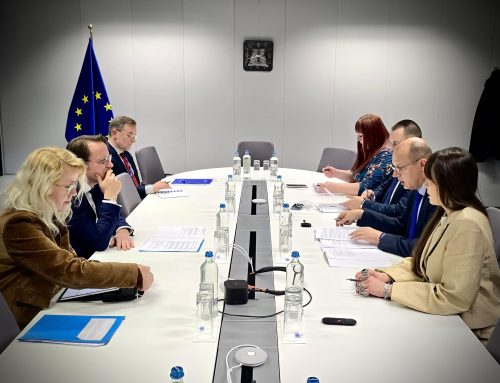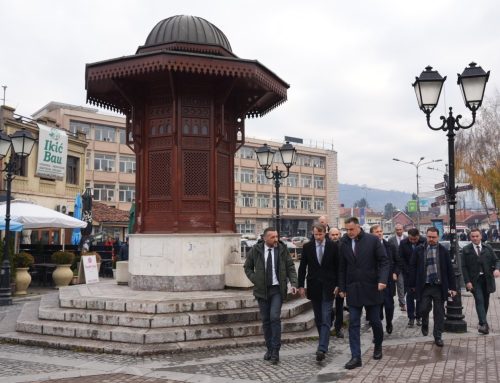Serbia accesses the club that has rules that will not be changed, and this process is about harmonisation of Serbian legislation with the EU standards and values, said Director General of the European Commission`s Directorate for Enlargement Christian Danielsson in conversation with students and professors of the Faculty of Political Sciences.
Director General of the European Commission`s Directorate for Enlargement Christian Danielsson stated today that conditions for Serbia`s accession to the EU are very clear and they are result of the Union`s enlargement experience to date.
“Negotiating framework is clear and it mentions a legally binding document and full normalisation of relations between Belgrade and Pristina, but it does not say how to get to that, said Danielsson in conversation with students at the Faculty of Political Sciences with the topic:”EU Enlargement Policy and Serbia: Next Steps and Key Challenges”.
Painstaking and necessary work
European Union started negotiations with Serbia with the same determination as when Sweden or some other country entered the EU, said this Swedish diplomat who is in his first official visit to Belgrade.
“Negotiations are painstaking, sometimes even too bureaucratic, but necessary process and they will last as much as it is needed and necessary”.
Danielsson did not want to comment on letter of MEPs requesting to set the investigation into political background of the murder of Prime Minister Zoran Djindjic, into murders of journalists and other crimes committed during the regime of Slobodan Milosevic, as conditions in Chapters 23 and 24; he only said that he received the letter and that he will reply.
“I would not comment that. We received the letter, and we generally reply to all letters that we receive”, said Danielsson to the press at the Faculty of Political Sciences.
Regarding the request by heads of the four strongest parliamentary groups in the EP to set solving political background as the condition for the opening of Chapter 23 (Judiciary and Fundamental Rights) in accession process, Danielsson said that the European Union is monitoring the functioning of rule of law on the grounds of criteria in Chapter 23 and 24.
The letter is dated 21 January, the day the first Intergovernmental conference Serbia-EU was held, and it was signed by Arnaud Danjean (EPP), Maria Elena Copa (Social democrats), Jelko Kacin (Liberals) and Marije Cornelissen (Group of the Greens).
“Serbia accesses the club that has rules that will not be changed and this process is about harmonisation of Serbian legislation with the EU standards and values, he said and added that the European Commission will equally insist on implementation as well as on adoption laws.
“Experience teaches us that from the very beginning we should focus on the key elements: rule of law and legal state, fight against corruption and organised crime, human rights…
During screening process, situation in Serbia need to be perceived by each of 35 chapters, using a unique method for each of them, he said.
Everyone are needed
Screening process and setting out the starting points is demanding, but necessary, and the result will be recommendation for the opening of negotiations on each chapter, said Danielsson.
He assessed that Serbia is determined to implement comprehensive transition process also because of the benefits in a view of economy, adding that EU accession is not project only for a part of society, but for the society as a whole and everyone must participate in it, including opponents.
The pace of the process depends only on what is happening in Serbia, pointed out Danielsson.
“Commitment, focus of all parts of society on the aim of entering the EU membership is crucial, as it was in other countries”.
Promises and conditions
Participating in conversation, Prof. Slobodan Samardzic reminded that Serbia started talks with the EU 13 years ago and many things changed in the meanwhile.
“European Union is now in the deep crisis both economic and political and organisational. That is no longer the organisation with which Serbia started negotiations back then. In the meanwhile, it become a second-class player on the international scene”, said Samardzic.
Samardzic put under suspicion the real wish of Brussels for Serbia to become member of the Union and also set the issue of non-transparent additional conditions from borders to position of minorities.
“Dates keep changing and there is no firm promise that Serbia will become a full member, when it does everything that is requested”, underlined Samardzic.
Professor Bojan Kovacevic noticed that European integrations are mostly a thing of elite and that wider classes of people do not share euro enthusiasm of their leaders. According to him, the EU is in “existential crisis” because many classes of society do not see the common future anymore, and he mentioned example of Greece and Portugal, problems of unemployment, in particular of youth in many EU countries.
Answering mentioned questions, Danielsson accepted that Europe is in crisis but said that the “whole world is in crisis”.
“I do not think that the EU crisis is existential. It did not emerge in the Union it was brought from outside, but Europe tackles it. You mention Greece and Portugal, that have serious problems, but there are also counter examples, such as Lithuania, that made an outstanding progress that would be impossible if it was not a member of the Union.”
Danielsson was categorical in claiming that Brussels sees Serbia as a full member of the Union.
“I am convinced that the EU had opened the negotiations with the firm conviction that Serbia, if it realises reforms and accepts general rules, has a spot among other European Union Member States”.
Along with students, professors and the Dean of the faculty Prof. Ilija Vujacic, Ambassador Michael Davenport, head of the EU Delegation to Serbia, as well as representatives of institutions, civil society and non-governmental sector, participated in the conversation at the Faculty of Political Sciences.



